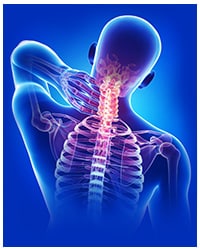Cervical spondylosis, or cervical osteoarthritis, involves the wear and tear of the cartilage and spinal discs in your neck. It is a common condition that mainly affects older people. As you age, your spinal discs dehydrate and shrink.

What are the symptoms of Cervical Spondylosis?
Most people with cervical spondylosis may not experience any pain or discomfort. Those with symptoms may experience neck pain or stiffness. You may also have other symptoms, such as:
- Pain around the shoulders, especially when standing, sitting, sneezing, or coughing
- Numbness, weakness, or a tingling sensation in your arms, hands, legs, or feet
- Loss of bowel or bladder control
Make an appointment with us if you experience these symptoms, and wish to get a diagnosis.
How is Cervical Spondylosis diagnosed?
To obtain a diagnosis, the orthopaedic specialist will start with a physical examination that includes:
- Checking the range of motion in your neck
- Testing your reflexes and muscle strength
To rule out other causes or to confirm the diagnosis, your orthopaedic specialist may order additional imaging tests, such as an x-ray, CT scan, or MRI, which may show abnormalities in your bones.
What treatments are there for Cervical Spondylosis?
Treatment for cervical spondylosis is focused on relieving your pain, lowering the risk of permanent damage to your spinal cord and nerves, and maintaining your quality of life.
Most cervical spondylosis symptoms get better with rest. However, please see a doctor if you lose bowel or bladder function; it is a medical emergency.
Your orthopaedic specialist may prescribe the following treatments to ease your discomfort:
Painkillers
These may include muscle relaxants or over-the-counter drugs to ease pain and reduce muscle spasms.
Nonsteroidal anti-inflammatory drugs
These medications reduce both pain and swelling or inflammation to provide relief.
Steroid injections
Steroids are directly injected into your spine to reduce tissue inflammation or pain caused by a pinched nerve.
Physical therapy
Your orthopaedic specialist might recommend a physiotherapist. He or she will help you to strengthen your neck and shoulder muscles and relieving pain.
Surgery
Your orthopaedic specialist may recommend surgery if your condition is severe, or does not respond to other forms of treatment. The surgery might involve removing a herniated disc or bone spur, removing part of a vertebra to create space in your spinal cord or nerves, or fusing a segment of your neck using bone graft and hardware.
Make an appointment
Make an appointment to consult an orthopaedic specialist. Select "Specialist Appointment". Under Specialist Appointment Details, select "Orthopaedic Surgery" or "Pain Management".
Make an enquiry. We will get back to you within 2 working days. You can reach us at 6311 2310.